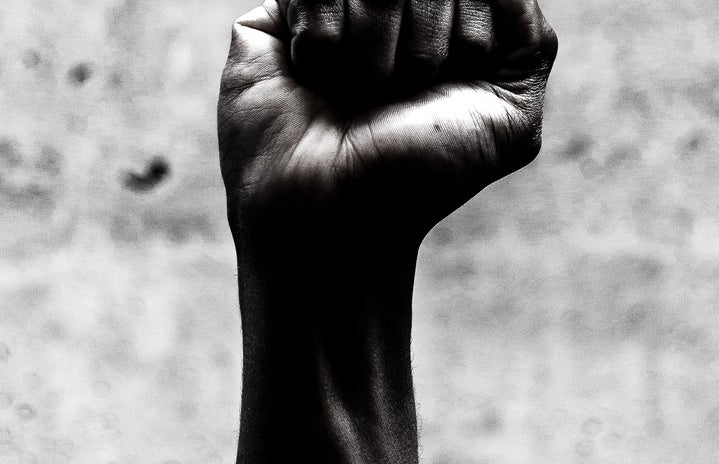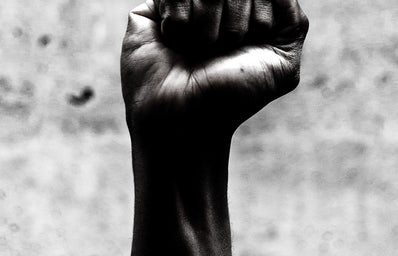Black History Month. The shortest month of the year, yet one of the most anticipated among the black community. In 1976, president Gerald Ford officially recognized Black History Month to be the month of February in order to “seize the opportunity to honor the too-often neglected accomplishments of black Americans in every area of endeavor throughout our history.” What once was a week of recognition for the black community, has revolutionized into an entire month of appreciation for all black accomplishments throughout history. But what exactly does black history mean to the black man and woman?

Black history is heritage. Every goal accomplished, every invention made, every spoken word is the beginning of a legacy. Many of these doors to change are open for the majority and closed to the minority, though change is too feared to be common in the first place. While the opportunities the black community have now in the 21st century are immense compared to previous times, someone had to open the doors first. The black community as well as other minorities have to work twice as hard just to get half of what they deserve. Black history helps us remember those who had to go through mountains just to create a molehill. It also emphasizes to the black youth community that no matter where you’ve been, that doesn’t determine where you are going. Many do not have the appropriate role models or professional figures in their lives to show them the ropes of society, so they turn to black history for a confidence boost and inspiration. In reality, black history is the only connection to heritage most black people have.
Black history is culture. Our culture is our identity. Without the culture embedded in black history, the concept of identity would remain a mystery, as many African Americans do not have the privilege of knowing their origin story or their ancestors’ for that matter. The connection an African American has to their roots and ancestors does not date back as far as that of other ethnicities due to the fact that those roots were forcefully lifted from under their feet. Not having this connection takes a toll on the development of the individual. However, the culture of it all is what seems to transcend all boundaries and limitations. Despite the lack of connection to direct ancestral history, the culture alone can make the black man feel a sense of true unity to everyone in the black community whether they know them or not. That is what black history does. Black history is unity. It gives black people a way to connect with each other despite their disconnected family tree.
Black history is revolutionary. The amount of concepts and inventions initiated by black entrepreneurs is enumerable, but often never mentioned. Did you know that an African American woman named Mary Beatrice Davidson Kenner invented the sanitary pad used today universally during menstrual periods? Did you know that the three-light traffic light used on road systems worldwide was invented by a black man named Garret Morgan? Did you know that home security systems, the dust pan, America’s first clock, the ironing board, modern locks and toilets, and even the mailbox were all invented by black people? Probably not, but there’s no doubt in my mind we all know that Eli Whitney invented the cotton gin. In a way, black history month has given ignorance an excuse for eleven months out of the year as unless one happens to be a true historical figure, their name is rarely, most times never, mentioned. It is no secret that America was built by black people, but history has a way of monumenting the liberations the black community has overcome while neglecting the constant progression from then to now. Many daily tasks we go through senselessly would be completely altered were it not for a black inventors, so why don’t we give them acknowledgement and appreciation?
Looking back through time, black men and women have come a long way in the world. In the realm of rights, equality, education, and all else, the purpose and accomplishments of the black man have been revolutionized. From Booker T. Washington establishing the pristine Tuskegee University in 1881, to 2009 when Barack Hussein Obama II was elected the first black president of the United States of America, the achievements in the African American community are inumerable, yet often forgotten, overlooked, and neglected.We must remember that it is impossible to understand where you are going, unless you know where you have been.
It is for that reason that it is so vital for us to not only honor and respect these accomplishments, but also to acknowledge and EXPECT them.
“Why every rich black [brother] gotta be famous
“Why every broke black [brother] gotta be brainless”
– Jermaine Cole
When J. Cole says these lines in his song G.O.M.D, he shed some light on a stereotype that is not often acknowledged. The uplifting of a limited few who were able to transcend change and fame has somehow translated to the minimization of those who have not been able to do the same in their own way. As society sees it, if one’s name doesn’t hold the same weight as say a Tiger Woods then that means you lack the intellect to do so, or if your pockets can not afford your potential, it simply does not exist. You hate to see it, but black history month is partially at fault for placing this complex into the minds of society. The way black history is taught, only inventors and revolutionaries like George Washington Carver and Martin Luther King and Frederick Douglass are entitled to recognition and appreciation. It is made out to seem as if black history is just that, history, but it is important to remember that EVERYDAY is black history in the making for the black community not just the month of February. Therefore, the appreciation, recognition, and acknowledgment of black history should be made 365 days out of the year, and not be diminished to measly 28 to 29 days. Black history month is a “blessing” but as Morgan Freeman felt, how can one delegate an entire race’s history, heritage, and culture to a month? The shortest month at that. With that logic, does that mean black history is simply neglected and unappreciated when it’s not black history month? In the 21st century, we have to make it a priority to normalize the making of black history all year round. Even in this day in age, society is still seeing “the first African American…” in the headlines of accomplishments and biographies from members of the black community. It wasn’t until 1965 that the first African American by the name of Catherine Davis was able to earn a Bachelor’s degree at Georgia Southern University. That’s just over fifty years ago. Times have changed, but for the black man and woman everyday is still a systematic battle. A battle that is inevitably a legacy in the making. Times have changed, and times are still changing everyday.
https://www.youtube.com/watch?v=GeixtYS-P3s#action=share
“Black history is American history.”
– Morgan Freeman
In order for our society to become more progressive and inclusive, black history has to be seen as American history. There is nothing wrong with expressing appreciation and dedicating time to acknowledge all of the black pioneers that have reconstructed their predestined paths, but such acts should not, as Morgan Freeman said, be “relegated to one month.” Such enthusiasm and recognition should be given all year round, 24/7. The act of creating black history has to become normalized or else every accomplishment made by an African American will be concentrated on the fact that they did while being black rather than on their performance and capabilities as an individual.
Black history is not a phenomenon that only makes an appearance once a year. To the black community, black history is everyday. and they take honor in their heritage, in their culture, in their revolution, and, most importantly, their history. Black history is black pride.



